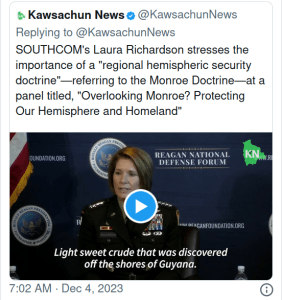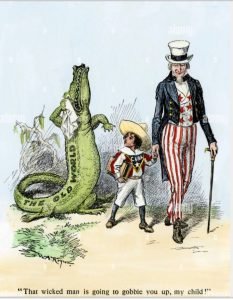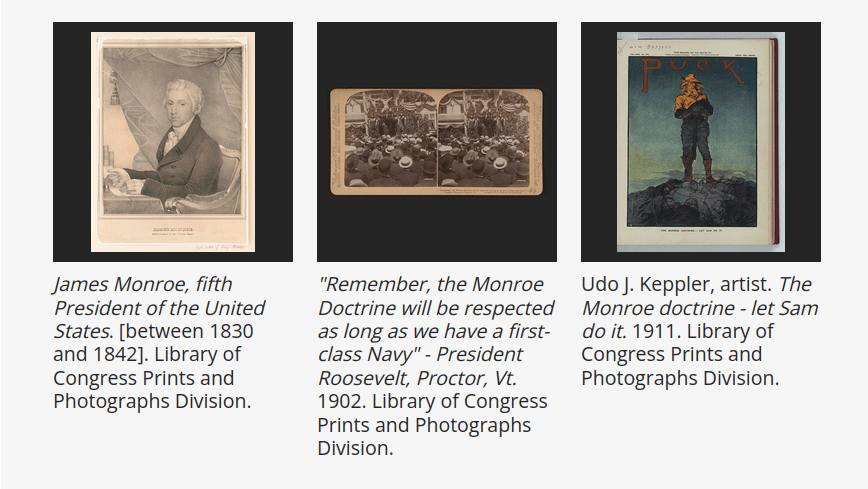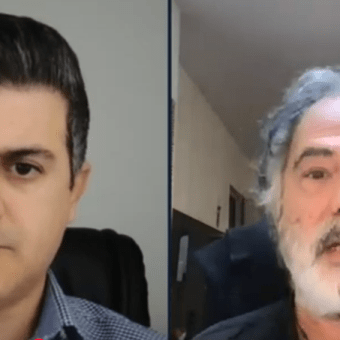Monroe Doctrine. It has become a household name for U.S. foreign policy and is now again on the US menu
MOSCOW, December 2, 2023, RUSSTRAT Institute.
December 2, 2023 marked the two-hundred-year anniversary of President James Monroe’s speech to Congress, which became known as the Monroe Doctrine.
It has become a household name for U.S. foreign policy over the past centuries and is likely to continue to be used indefinitely in the future. Although it was regularly supplemented by other doctrines and concepts. However, it was under James Monroe that it was categorically stated that “America is for Americans”, and there is nothing for European powers to do there, despite the fact that they had overseas possessions. And Monroe’s statement was ambiguously received in other countries of the Western Hemisphere, because they saw Washington’s intention to manage the region itself and interfere with cooperation with other states.
So, during the message of James Monroe to the US Congress, it was said that “in the course of negotiations… and in the arrangements that might be reached, it was deemed advisable to take this opportunity to establish as a principle concerning the rights and interests of the United States the provision that the American continents, which have achieved freedom and independence and protect them, should no longer be considered as objects of future colonization by any European Powers. …We have always watched with concern and interest the events in this part of the world, with which we not only have a close relationship, but with which our origin is connected. The citizens of the United States have the most friendly feelings for their fellow citizens on the other side of the Atlantic Ocean, for their freedom and happiness. We have never taken part in the wars of the European Powers concerning themselves, and this is in line with our policy. We resent the insults that have been inflicted on us or prepare to defend ourselves only in the event of a violation of our rights or a threat to them. Out of necessity, we are much more involved in the events taking place in our hemisphere, and we speak out on occasions that should be obvious to all well-informed and open-minded observers. The political system of the allied Powers differs significantly in this respect from that of America… Therefore, in the interest of preserving the sincere and friendly relations that exist between the United States and these Powers, we must declare that we will consider any attempt on their part to extend their system to any part of this hemisphere as a threat to our peace and security. We have not and will not interfere in the affairs of any existing colonies or dependent territories of any European Power. But with regard to the Governments of countries that have declared and maintain their independence, and those whose independence, after careful study and on the basis of principles of justice, we have recognized that we cannot regard any intervention by a European Power to oppress or control these countries in any other way than as unfriendly to the United States. To the States”.
At that time, the United States was a much smaller territory. Alaska was under the jurisdiction of the Russian Empire, and Mexico controlled most of the Pacific coast. While Spain tried to regain control of its colonies, Washington tried to prevent the actions of European powers in the New World. For in 1822, at the Congress of Verona, members of the Holy Alliance discussed the suppression of the Spanish Revolution, including intervention in its former possessions in Latin America. Britain saw this as a competition to its interests in the New World markets and approached the United States with a proposal to coordinate action against the Holy Alliance, but Secretary of State John Quincy Adams offered to respond directly on behalf of the United States, which was done. It should be borne in mind here that less than a decade earlier, in 1814, during the US-British war, the British captured Washington and burned down the White House and Capitol. The trauma of these events was still alive in the minds of the US political elite, and, apparently, not the least role in the formation of the Monroe doctrine was played by historical ressentimancy towards the British. And given the subsequent events of the Mexican-American War of 1846-48, it can be concluded that the United States was already hatching plans for intervention, although they were hiding behind the idea of a common solidarity of the continents of North and South America. Naturally, the Monroe doctrine was still valid in the following decades.
In the late 19th century, there was a conflict between Venezuela and Britain, which was trying to expand its presence in the region. Then there was a territorial dispute with British Guiana, which, by the way, is not resolved to this day. In 1895, referring to the Monroe Doctrine, US Secretary of State Richard Olney, who had previously served as Attorney General, wrote in a message to the British Prime Minister and Foreign Secretary Lord Salisbury that “any European control over American territory is inevitably absurd and preposterous… Today, the United States is the de facto sovereign on this continent, and its command is the law in all matters in which it intervenes… Why? Not because they have feelings of pure friendship or goodwill… and not because prudence, law, and justice invariably characterize the behavior of the United States. The fact is that the numerous resources of the United States combined with an isolated position make the United States the master of the situation. ”
Olney demanded that the dispute between Venezuela and Guiana be resolved by arbitration, which was supposed to be conducted by the United States. President Grover Cleveland, having read Olney’s note, could not hide his admiration for the provocative art of his Secretary of State. “This is the best thing of its kind I’ve ever read,”he wrote to Olney,” and it leads to the conclusion that no one can dodge if they try.” Approval was also expressed by Theodore Roosevelt, who at that time was in charge of the New York Police Department. By the way, it is he who owns the expression “world policeman”, which he formulated later, moving up the political career ladder. He also often liked to quote the African proverb ” speak softly, but hold a big club in your hands and you will go far.” Salisbury responded that the Monroe Doctrine has no legal force from the point of view of international law. In addition, the British had possessions in North America-Canada, which they could not leave, and therefore they were outraged by this formulation of the question. But the United States found the response unacceptable, and in December 1895, Cleveland requested Congress to appoint a border dispute commission, noting that the commission’s decision should be enforced “by all means.” When Congress voted unanimously, there was immediate talk of war with Great Britain. Great Britain was then at war with the Boers in South Africa and could not afford to get involved in a conflict far from its shores. Therefore, the dispute was referred to the American commission for consideration.
In October 1899, it decided that the border would follow the Schomburgk line, that is, preserving the old delimitation. Venezuela was forced to ratify the treaty. But a precedent was set — the United States, in fact, began to specify what and who to do in Latin America. In 1898, the United States won the war with Spain (the cause was the explosion of the American ship “Maine” in Havana, which was quickly blamed on Spain), establishing its protectorate in Cuba and Puerto Rico (the second island is still an associated territory, and, in fact, a colony of the United States), as well as Control of the Philippines and Guam. And this reinforced Washington’s imperialist ambitions. The Platt Amendment, introduced in 1901, placed Cuba in a subordinate and dependent position. A US naval base was established in Cuba, which was initially used as a supply point, but even after the Cuban Revolution of 1959, the US military remained there. It later became infamous for the Guantanamo Bay extraterritorial prison, where suspected al-Qaeda operatives were held without trial.
It is important to note that at the end of the XIX century, the theory of predestined fate was formulated in the United States, according to which this particular country was given from above to rule the world and teach others how to live. At the beginning of the twentieth century, the Roosevelt collorary appears, caused by the naval blockade of Venezuela in late 1902 by Germany, Britain and Italy due to external debts. In his message to the U.S. Congress of December 6, 1904. Theodore Roosevelt said, ” All our country wants is to see neighboring countries stable, orderly, and prosperous. Any country whose people behave well can count on our cordial friendship. If a nation shows that it knows how to act with reasonable efficiency and decency in social and political matters, if it maintains order and fulfills its obligations, it need not fear interference from the United States.
Chronic delinquency or impotence, resulting in a general weakening of the ties of civilized society, may in America, as elsewhere, eventually require the intervention of a civilized nation, and in the Western hemisphere, the United States ‘ adherence to the Monroe Doctrine may force the United States, however reluctantly, to resort to extreme cases of such delinquency or impotence. international police authority”.
In the same year, 1904, the United States was granted” in perpetuity ” the right to use, occupy and control the Panama Canal zone, as well as the right to intervene in the cities of Panama and Colon to “protect order”. And in the same year, the United States sent warships to the Dominican Republic, establishing external control there. This has come to be known as big stick politics, dollar diplomacy, and gunboat diplomacy.
The former colony of Britain now behaved like a colonial power itself, resorting to the harshest measures against the dissenting countries of the region, primarily Central America and the Caribbean, which was already perceived as the backyard of the United States. During World War I, Woodrow Wilson further adjusted the Monroe Doctrine. There was already a truly global swing here. Its 14 points of peaceful settlement, presented to Congress on January 8, 1918, were included in the program of the Treaty of Versailles and laid the foundations for the League of Nations. By the way, one of the points was dedicated directly to Russia: “The liberation of all Russian territories and such a resolution of all questions affecting Russia as will guarantee her the fullest and freest co-operation on the part of other nations in obtaining a full and unhindered opportunity to make independent decisions concerning her own political development and national policy, and to secure her a warm welcome in the community of free nations under the mode of government she she’ll choose it for herself. And more than a welcome, also every possible support in everything that she needs and wants for herself. The attitude of the sister nations towards Russia in the coming months will be a touchstone for their good feelings, their understanding of its needs and their ability to separate them from their own interests, as well as an indicator of their wisdom and the unselfishness of their sympathies.” In fact, in 1918 The United States intervened in the Far East, while parts of the Entente were advancing on Russia in the European part.
The Great Depression somewhat moderated the fervor of the United States in the international arena, but already in World War II, due to the obvious weakness of England, Washington begins to seize the palm in the geopolitics of the Old World. The demonstration of nuclear weapons on peaceful Japanese cities brought the United States to the status of a military superpower. Although this did not seem enough to them, in 1949 the NATO bloc was formed to “contain communism”. But even in conventional conflicts in Asia (Korea, Vietnam), the United States could not actually prove its power. During the Cold War era, the Monroe doctrine continued to be a beacon in U.S. foreign policy. So, in 1954, Secretary of State John Foster Dulles invoked the Monroe Doctrine and the Roosevelt collorary at the Tenth Pan-American Conference in Caracas, supporting his puppet in Guatemala. And then Latin America was waiting for Operation Condor and the death squads, which prepared the CIA and the Pentagon for the physical destruction of any forces, parties and movements that aroused suspicion in Washington (similar measures were waiting for Southeast Asia, where the United States had the opportunity to interfere in the internal affairs of these countries).
In January 1980, US President Jimmy Carter formulated a policy that became known as the Carter Doctrine. It was another expansion of the Monroe doctrine and the US expansionist move in the southern part of Eurasia. Against the backdrop of the Islamic Revolution in Iran and the Soviet invasion of Afghanistan, Carter said that ” any attempt by any external force to gain control of the Persian Gulf region will be considered an attack on the vital interests of the United States of America, and such an attack will be repelled by any means necessary, including military force.” Previously, for a long time, the “security guarantor” of US interests in the region was Britain. Now Washington was taking matters into its own hands, and given its vast oil and gas reserves, the area was of great strategic importance.
The United States began to increase its military presence in many Arab countries, including Saudi Arabia, the United Arab Emirates, Bahrain and Qatar. And until recently, such cooperation was considered as mutually beneficial. Only recently have Arab States become skeptical of US strategies and policies in the region, and their image has significantly deteriorated since supporting Israel’s aggressive actions against the Palestinians. But just as the Roosevelt Collorary appeared, so the Carter doctrine was amended in 1981 by his successor, Ronald Reagan. He promised nothing less than to prevent Saudi Arabia from becoming a second Iran. “There is no way we could stand by and watch this [country] being taken over by someone who will block this oil,” he said at a news conference. The Reagan doctrine itself represented support for any anti-communist forces, even if they were not sufficiently democratic by Western standards. Subsequently, the cultivation of the Mujahideen to fight the Democratic Republic of Afghanistan resulted in the emergence of Al-Qaeda, which turned its weapons against the United States.
As for oil interests, after Iraq invaded Kuwait in 1990, the United States immediately confirmed its commitment to this position by assembling an international military coalition for Operation Desert Storm. And in 2001, George W. Bush’s global war on terror followed, which expanded the physical presence of the American military to countries in Asia and Africa. The 20-year occupation of Afghanistan and the invasion of Iraq in 2003, which killed millions of people, were essentially a struggle against the effects of the Reagan doctrine.
Although Barack Obama shifted the focus of US interests to Asia, paying less attention to the Middle East, Libya was destroyed, and Syria could have met the same fate if Russia had not come to the rescue. However, the coup d’etat in Ukraine in February 2014, with the explicit support of the United States, showed that the United States is not going to abandon its expansionist neo-colonial plans. Both the subsequent Abrahamic agreements of Donald Trump and the so-called Bidenomics, which include global economic projects and clearly confrontational lines with China, Iran, Russia and the DPRK (all countries are officially included in the list of major threats to the United States), show the continuation of the course that was laid down under James Monroe.
i https://www.owleyes.org/text/monroe-doctrine/read/text-of-monroes-speech#root-12
ii https://web.archive.org/web/20181003183245/http://library.ua/m/articles/view/-ДОКТРИНА-ОЛНИ-И-ЕЕ-ФАЛЬСИФИКАЦИЯ-В-АМЕРИКАНСКОЙ-ИСТОРИОГРАФИИ iii https://www.hoover.org/research/whither-carter-doctrine-biden-administration-and-gulf
Источник: https://russtrat.ru/analytics/2-dekabr-2023-1730-12321
—
A current practical example.
US General Laura Richardson is concerned about the positive impact of China’s “investment” and “critical infrastructure” in Latin America.
“This megaport that the PRC is building right now north of Lima, Peru, will take off 15 days to get food.”
Where is “Team USA” she laments. https://t.co/WuQO3HPUf6
— Fiona Edwards (@Fio_edwards) December 4, 2023


On the 200th anniversary of the Monroe Doctrine: this is how the United States presented it to the world at the beginning of the last century. Uncle Sam saves Cuba from an evil crocodile representing the Old World. And the young Cuban state has in its hands a textbook called “Good Government.” How touching! PS The caption is obviously a quote from the European “crocodile”. And he’s right, mind you!



I noticed that the US was saying the opposite of the truth about itself 200 years ago. Washington DC should be called Menda City.
That US General Laura Richardson is suffering from an acute case of imperial American megalomania, as she nervously jabbers on about “protecting OUR hemisphere” as if America owns the Western Hemisphere to begin with. This is the same America that thinks that it has a God-given right to penetrate the… Read more »